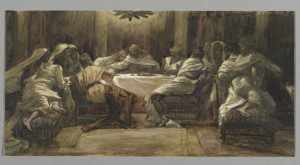
(“The Last Supper: Judas Dipping his Hand in the Dish”)
James Tissot (d. 1902)
Wikimedia CC public domain; click to enlarge
Compare Luke 22:21-23
Two quick observations:
1.
Each of the eleven apostles who were innocent in this matter worried that he might be the one who would betray Jesus. This is commendable. On this occasion, at least, none of them seems to have imagined himself invincible, impervious to sin or temptation.
We should all recognize our own capacity to mess up badly. Those who don’t recognize it, I think, may often be in considerable danger.
Judas, of course, asked the question “Is it I?” quite insincerely. He was posing. He knew full well that he had already entered into an agreement with the leaders of the Jews to betray Jesus.
2.
It’s important to recognize the principle expressed here that, while evils occur in this fallen and mortal world — and even do so, generally speaking, as part of the divine design (just as Christ’s death and atonement were specifically designed and intended by God) — that doesn’t get those who perpetrate them off the hook.
















